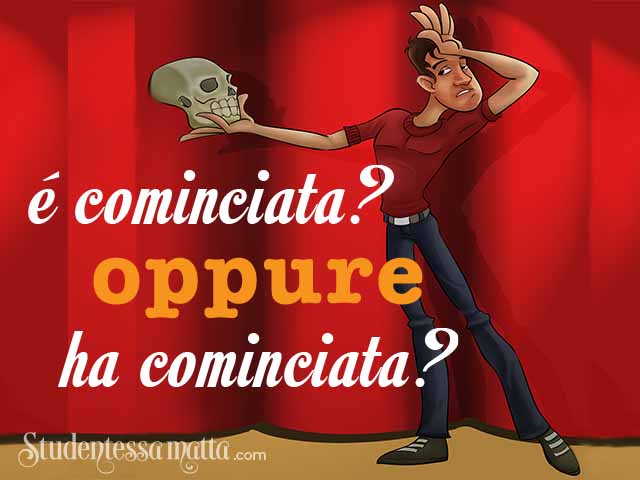
È cominciata o ha cominciato? Che bella domanda!
The dilemma of Italian Transitive and Intransitive Verbs
Capire la differenza tra verbi intrasitivi e trasitivi
Understanding the difference between transitive and intransitive verbs
In italiano, ci sono verbi transitivi e intransitivi. Alcuni, però, possono essere entrambi!
In Italian, there are transitive and intransitive verbs. Some, however, can be both!

Prendiamo ad esempio il verbo cominciare:
Take for example the verb cominciare:
Ieri la festa è cominciata tardi.
Yesterday the party began late.
Abbiamo cominciato la festa tardi.
We began the party late.
È cominciato a piovere.
It began to rain.
La pioggia ha cominciato a bagnarmi.
The rain began to soak me.

Che cosa sono i verbi transitivi?
What are transitive verbs?
I verbi transitivi esprimono un’azione che passa dal soggetto a un oggetto diretto, rispondendo alle domande “chi?” o “che cosa?”. Non richiedono preposizioni.
Transitive verbs express an action that passes from the subject to a direct object, answering the questions “who?” or “what?”. They don’t require prepositions.
Maria scorre (che cosa?) la rubrica telefonica.
Maria scrolls (what?) the phone book.
Sofia fotografa (chi?) le bambine.
Sofia photographs (who?) the girls.
Francesca prepara (che cosa?) la pizza.
Francesca prepares (what?) the pizza.

Cosa sono i verbi intransitivi?
What are intransitive verbs?
I verbi intransitivi esprimono uno stato o una condizione e non richiedono un oggetto diretto. Rispondono a domande come “dove?”, “a chi?”, o “da dove?”.
Intransitive verbs express a state or condition and don’t require a direct object. They answer questions like “where?”, “to whom?”, or “from where?”.
Il fiume Po scorre (dove?) nella Pianura Padana.
The Po River flows (where?) in the Paduan plain.
Paola è felice.
Paola is happy.
Alberto corre lentamente.
Alberto runs slowly.
Passato prossimo: quando usare “essere” o “avere”?
Past tense: when to use “essere” or “avere”?
Verbi Transitivi / Transitive Verbs
I verbi transitivi nel passato prossimo usano l’ausiliare avere. L’azione ha sempre un destinatario diretto.
Transitive verbs in the past tense use the auxiliary verb avere. The action always has a direct recipient.

Ho finito di guardare (che cosa?) lo spettacolo verso le nove.
I finished watching (what?) the show around nine.
Franco ha corso (che cosa?) una maratona.
Franco ran (what?) a marathon.
Maria ha cambiato (che cosa?) il vestito.
Maria changed (what?) the dress.
Verbi Intransitivi / Intransitive Verbs
I verbi intransitivi nel passato prossimo usano l’ausiliare essere. Non hanno un destinatario diretto ma spesso indicano uno stato o un movimento.
Intransitive verbs in the past tense use the auxiliary verb essere. They don’t have a direct recipient but often indicate a state or movement.

Il marziano è partito (dove?) per Nettuno.
The Martian left (where?) for Neptune.
Sono salita (dove?) sull’autobus.
I got on (where?) the bus.
Lo spettacolo è finito (quando?) verso mezzanotte.
The show ended (when?) around midnight.
Un po’ di pratica! Time for Practice!
Esercizi per te. Riempiere lo spazio vuoto
con il verbo ausiliare “essere” o “avere”.
Il mio corso di Italiano _______ cominciato ieri.
My Italian course started yesterday.
Quella donna_____ corso molte marato.
That woman has run many marathons.
La primavera ________ finita bruscamente… adesso sembra la metà dell’estate. Spring ended abruptly… now it seems the middle of the summer.
Francesca _______ corsa in lavanderia, ma era chiusa perché è sabato.
Francesca ran to the dry cleaners, but it was closed because it was Saturday.
________ cominciato il libro la scorsa settimana.
They began the book last week.
Marco ________ finito i compiti?
Did Marco finish his homework?
Buoni studi!
Subscribe to the Matta Blog
Receive 5 Things to Do Every Day to Learn Italian FREE!
Stay updated with the award-winning Studentessa Matta Blog on Italian language and culture. Sign up to become a VIP subscriber and be the first to receive the latest blog updates. Join our community today and dive deeper into the Italian learning journey!












Ciao Mélissa, le spiegazione sul due verbi sono ottimi….
Grazie di cuore, a la prossima lezione, 🙏💐
Cari saluti,
Veronika